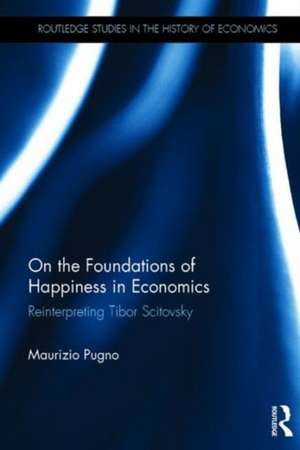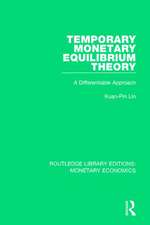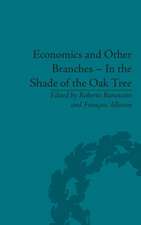On the Foundations of Happiness in Economics: Reinterpreting Tibor Scitovsky: Routledge Studies in the History of Economics
Autor Maurizio Pugnoen Limba Engleză Hardback – 19 mai 2016
Given the recent rise of behavioural economics and happiness economics, this book aims to show how far ahead of his time Scitovsky was in his work on individual welfare (or wellbeing). It traces the evolution of Scitovsky’s original thought, arguing that he has been frequently misunderstood, before undertaking formal analysis in order to demonstrate how far his work anticipated or even went beyond the recent advances in economics. This volume also explores Scitovsky’s work in the context of Keynes’ work on wellbeing, offering a new perspective on welfare in the history of economic thought. Other issues discussed in this text regard creativity and social skills, hedonism and eudaimonia, parenting and education, addiction, work/leisure balance, policies for happiness, paternalism, and the quality of economic growth.
This book addresses a variety of readers, such as those interested in the history of economics, as well as students and researchers concerned with the economic theory of well-being.
| Toate formatele și edițiile | Preț | Express |
|---|---|---|
| Paperback (1) | 298.13 lei 6-8 săpt. | |
| Taylor & Francis – 14 aug 2018 | 298.13 lei 6-8 săpt. | |
| Hardback (1) | 848.55 lei 6-8 săpt. | |
| Taylor & Francis – 19 mai 2016 | 848.55 lei 6-8 săpt. |
Din seria Routledge Studies in the History of Economics
-
 Preț: 378.26 lei
Preț: 378.26 lei -
 Preț: 316.51 lei
Preț: 316.51 lei -
 Preț: 302.55 lei
Preț: 302.55 lei - 9%
 Preț: 1003.12 lei
Preț: 1003.12 lei -
 Preț: 324.46 lei
Preț: 324.46 lei -
 Preț: 311.28 lei
Preț: 311.28 lei -
 Preț: 326.99 lei
Preț: 326.99 lei -
 Preț: 326.82 lei
Preț: 326.82 lei -
 Preț: 665.69 lei
Preț: 665.69 lei - 9%
 Preț: 935.40 lei
Preț: 935.40 lei -
 Preț: 395.82 lei
Preț: 395.82 lei -
 Preț: 280.74 lei
Preț: 280.74 lei -
 Preț: 318.31 lei
Preț: 318.31 lei -
 Preț: 392.72 lei
Preț: 392.72 lei - 8%
 Preț: 392.82 lei
Preț: 392.82 lei -
 Preț: 310.43 lei
Preț: 310.43 lei -
 Preț: 214.15 lei
Preț: 214.15 lei -
 Preț: 399.71 lei
Preț: 399.71 lei -
 Preț: 157.37 lei
Preț: 157.37 lei - 26%
 Preț: 850.91 lei
Preț: 850.91 lei - 27%
 Preț: 995.39 lei
Preț: 995.39 lei - 18%
 Preț: 1005.04 lei
Preț: 1005.04 lei - 18%
 Preț: 1002.60 lei
Preț: 1002.60 lei - 28%
 Preț: 1046.46 lei
Preț: 1046.46 lei - 18%
 Preț: 1280.31 lei
Preț: 1280.31 lei - 18%
 Preț: 1055.51 lei
Preț: 1055.51 lei - 18%
 Preț: 1055.51 lei
Preț: 1055.51 lei - 28%
 Preț: 987.72 lei
Preț: 987.72 lei - 25%
 Preț: 824.17 lei
Preț: 824.17 lei - 18%
 Preț: 1061.93 lei
Preț: 1061.93 lei - 18%
 Preț: 716.32 lei
Preț: 716.32 lei - 18%
 Preț: 1006.07 lei
Preț: 1006.07 lei - 18%
 Preț: 1069.92 lei
Preț: 1069.92 lei - 12%
 Preț: 342.67 lei
Preț: 342.67 lei - 18%
 Preț: 1056.00 lei
Preț: 1056.00 lei - 28%
 Preț: 991.34 lei
Preț: 991.34 lei - 18%
 Preț: 1076.53 lei
Preț: 1076.53 lei - 18%
 Preț: 698.08 lei
Preț: 698.08 lei - 22%
 Preț: 332.02 lei
Preț: 332.02 lei - 18%
 Preț: 1169.78 lei
Preț: 1169.78 lei - 18%
 Preț: 1059.84 lei
Preț: 1059.84 lei - 30%
 Preț: 852.88 lei
Preț: 852.88 lei - 25%
 Preț: 830.10 lei
Preț: 830.10 lei - 18%
 Preț: 1119.93 lei
Preț: 1119.93 lei - 18%
 Preț: 1062.98 lei
Preț: 1062.98 lei - 18%
 Preț: 953.01 lei
Preț: 953.01 lei
Preț: 848.55 lei
Preț vechi: 1178.64 lei
-28% Nou
Puncte Express: 1273
Preț estimativ în valută:
162.39€ • 168.91$ • 134.06£
162.39€ • 168.91$ • 134.06£
Carte tipărită la comandă
Livrare economică 15-29 aprilie
Preluare comenzi: 021 569.72.76
Specificații
ISBN-13: 9781138838369
ISBN-10: 1138838365
Pagini: 262
Ilustrații: 6
Dimensiuni: 156 x 234 x 19 mm
Greutate: 0.5 kg
Ediția:1
Editura: Taylor & Francis
Colecția Routledge
Seria Routledge Studies in the History of Economics
Locul publicării:Oxford, United Kingdom
ISBN-10: 1138838365
Pagini: 262
Ilustrații: 6
Dimensiuni: 156 x 234 x 19 mm
Greutate: 0.5 kg
Ediția:1
Editura: Taylor & Francis
Colecția Routledge
Seria Routledge Studies in the History of Economics
Locul publicării:Oxford, United Kingdom
Public țintă
Postgraduate and UndergraduateCuprins
Introduction
1. Happiness in economics: the roots and perspectives of a research programme
2. Scitovsky’s research programme on human welfare
3. Enjoying creative activity by developing life skill
4. Comfort vs. creative activity as two sources of well-being
5. Addiction: from well-being to ill-being
6. Are we heading for a ‘joyless economy’?
A new look at Scitovsky’s concern
7. Keynes’s ‘Economic possibilities for our grandchildren’:
Scitovsky’s suggested new interpretation
8. Creative activity and well-being for a new economic growth
Conclusions
1. Happiness in economics: the roots and perspectives of a research programme
2. Scitovsky’s research programme on human welfare
3. Enjoying creative activity by developing life skill
4. Comfort vs. creative activity as two sources of well-being
5. Addiction: from well-being to ill-being
6. Are we heading for a ‘joyless economy’?
A new look at Scitovsky’s concern
7. Keynes’s ‘Economic possibilities for our grandchildren’:
Scitovsky’s suggested new interpretation
8. Creative activity and well-being for a new economic growth
Conclusions
Recenzii
‘This is a most welcome contribution. Maurizio Pugno makes a valuable effort to introduce and reinterpret the insight by Tibor Scitovsky into Modern Happiness Economics. These insights have wrongly, and to a large extent, been disregarded in the literature. Pugno discusses e.g. the importance of intrinsic motivation and creativity for happiness, opening up a challenging and fruitful direction of research.’ — Bruno S. Frey Permanent Visiting Professor, University of Base, Switzerland.
'Scitovsky's pioneering contributions on the relationship between economic growth and human wellbeing have so far not received from modern behavioural and happiness economists the attention they deserve. This should change as a result of Maurizio Pugno's labour of love that has resulted in this most useful volume that sets Scitosvky's work in context and presents it in today's more technical style' — Peter Earl, University of Queensland, Australia and co-editor of the Journal of Economic Psychology 2000-2003.
'Scitovsky's pioneering contributions on the relationship between economic growth and human wellbeing have so far not received from modern behavioural and happiness economists the attention they deserve. This should change as a result of Maurizio Pugno's labour of love that has resulted in this most useful volume that sets Scitosvky's work in context and presents it in today's more technical style' — Peter Earl, University of Queensland, Australia and co-editor of the Journal of Economic Psychology 2000-2003.
Descriere
Economic growth has extraordinarily increased the availability of market goods to satisfy people’s need for comfort, but at the same time it has also raised great challenges to their working and family life. Will people learn the skill necessary to cope with these challenges and draw full enjoyment from economic growth? On the Foundations of Happiness in Economics explores this question by examining the work of Tibor Scitovsky, author of The Joyless Economy.

















